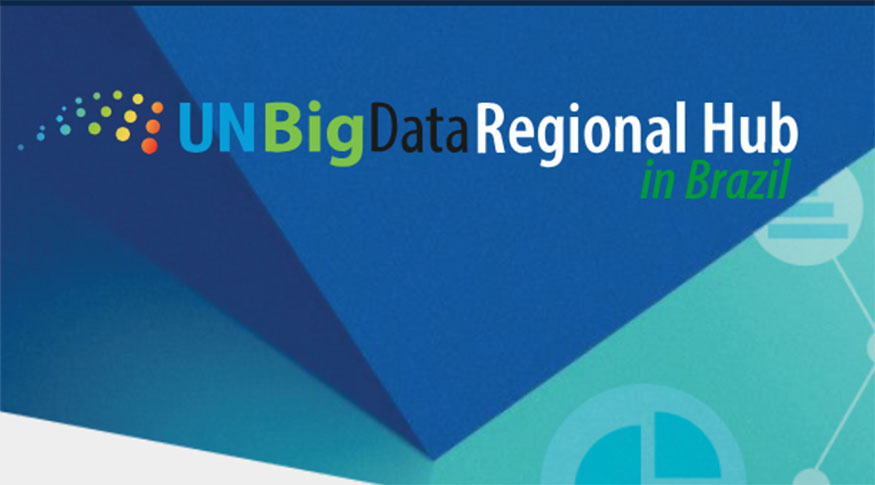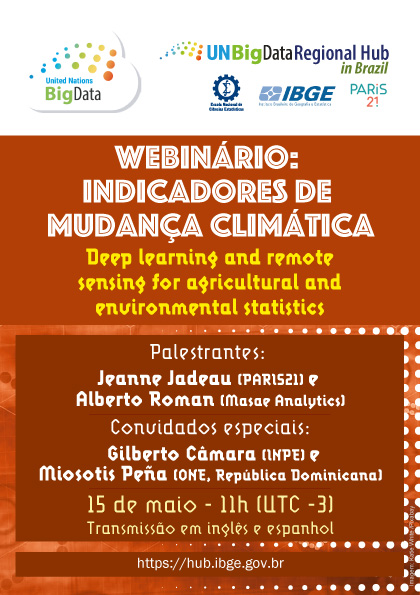ENCE
Agricultural and environmental statistics are topics of webinar by the Regional Hub for Regional Data
May 06, 2025 04h24 PM | Last Updated: May 08, 2025 04h53 PM

The UN Regional Hub for Big Data in Brazil is promoting a series of webinar about the production of climate change indicators. The coming webinar will be on May 15, at 11 am, covering deep learning and remote sensing for agricultural and environmental statistics. Speakers will be Jeanne Jadeau (PARIS21) and Alberto Roman (Masae Analytics), with the participation of Gilberto Câmara (INPE) and Miosotis Peña (ONE - Dominican Republic).
Free registration is open. To participate in the webinar, click at https://hub.ibge.gov.br/index_port.htm. The event will be streamed in English with simultaneous interpretation into Spanish. With this seminar, undergraduate students from ENCE can obtain complementary hours upon identification with their full name, and attendance to the event. For receiving certificates, students must send an e-mail to hubbrazil@ibge.gov.br.
The Partnership in Statistics for Development in the 21st Century (PARIS21), in cooperation with the technical report Masae Analytics, will present a data initiative conducted with the National Statistical Office of Mongolia. The pilot project uses deep learning and remote sensing to generate herd estimates and monitor the impact of the grazing activity. Cases of additional use related to remote sensing applied to agricultural monitoring, such as classification of crops, yield estimates and land use mapping will also be dealt with will also be presented.

Jeanne Jadeau is the leader of the innovation and modernization team of PARIS21 (Partnership in Statistics for Development in the 21st Century). She has a degree in Engineering with a focus on data science and statistics with experience in the conduction of quantitative surveys and training programs in countries of low and high income.
Alberto Roman is a senior expert scientist in remote sensing at Masae Analytics. He has a PhD degree in Geophysics from the Institut de Physique du Globe de Paris, where he was a member of the Geophysical Fluid Dynamics team.
Gilberto Câmara is a Brazilian researcher of Geoinformatics, Spatial Analysis and Modeling of Soil Use. He is currently a senior researcher at the INPE, a visiting researcher at FGV Agro and a consultant for the FAO-EOSTAT initiative. Seu site é https://gilbertocamara.org.
Climate Change Indicator Series
The Regional Hub for Big Data is hosting a series of webinars to share experiences in using new data sources and technologies for climate change mitigation. Topics covered include biodiversity, tourism sustainability, and the integration of geospatial information for land use monitoring. Sessions are in Spanish or English, and feature experts from Latin America and the Caribbean, as well as from other regions.
The series began in September 2024 and featured webinars on climate change and disaster metrics, tourism sustainability, hydrogeological disasters, remote sensing and geographic information and child climate risk. The six events brought together 741 participants from 28 countries: Saudi Arabia, Argentina, Aruba, Belize, Bangladesh, Bolivia, Brazil, Chile, Colombia, Costa Rica, Ecuador, El Salvador, Slovenia, Guatemala, Honduras, Jamaica, Mexico, Nicaragua, the Netherlands, Panama, Paraguay, Peru, the Dominican Republic, Trinidad and Tobago, Uruguay, and Venezuela. Recordings are available on the Hub website. The series will continue with monthly webinars until July 2025.
ENCE/IBGE coordinates UN Regional Hub for Big Data in Brazil

Resulting from a partnership between the IBGE and the UN Statistics Division, the UN Regional Hub for Big Data in Brazil (https://hub.ibge.gov.br) was launched in November 2021 at the 11th Statistical Conference of the Americas, held by the Economic Commission for Latin America and the Caribbean (ECLAC). The Hub is hosted by the National School of Statistical Sciences (ENCE), braço acadêmico do IBGE, the academic arm of the IBGE, which coordinates the efforts and contributions of the different areas of the Institute in supporting the activities of the Regional Hub.
The project aims at contributing to the advancement of the use of big data to improve the production of official statistics, promoting knowledge sharing and the development of innovative initiatives in Latin America and the Caribbean. In addition to Brazil, four other countries are also part of the initiative as hosts of regional or global hubs: the United Arab Emirates, Indonesia, Rwanda, and China.




















